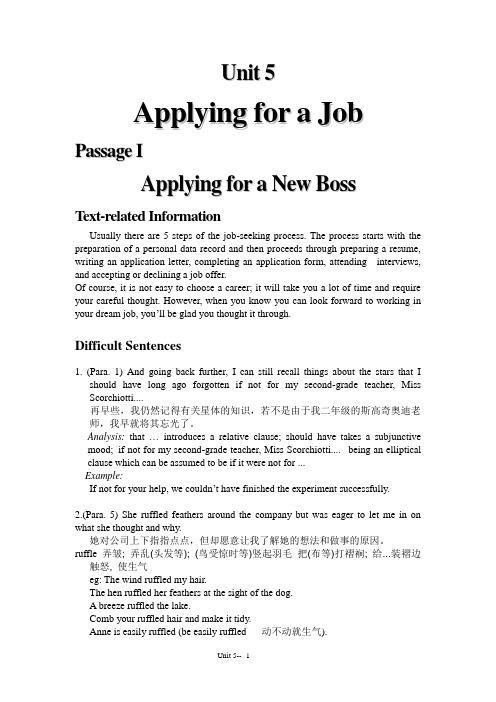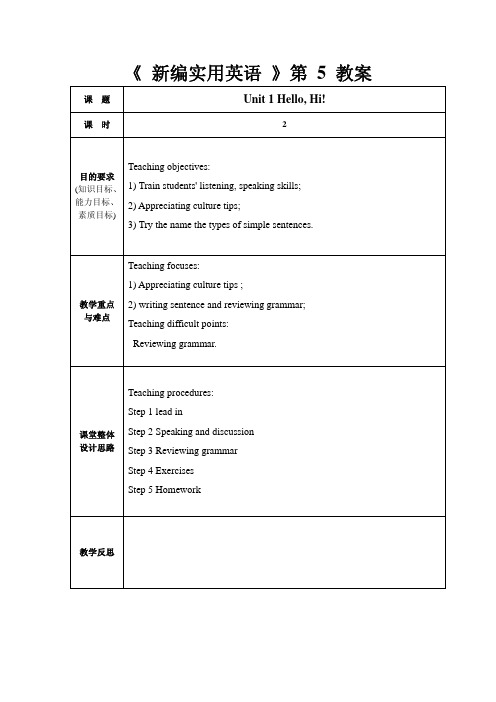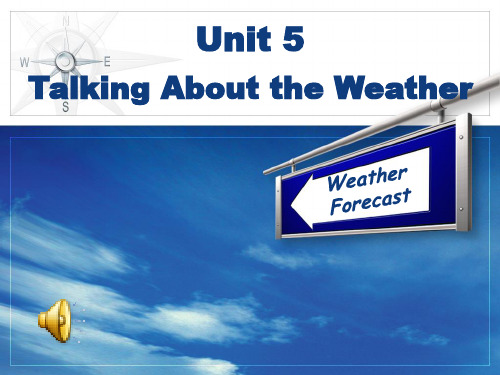新编实用英语PE1-U5-T
- 格式:ppt
- 大小:3.30 MB
- 文档页数:19

U n i t5A p p l y i n g f o r a J o bP a s s a g e IA p p l y i n g f o r a N e wB o s sT ext-related InformationUsually there are 5 steps of the job-seeking process. The process starts with the preparation of a personal data record and then proceeds through preparing a resume, writing an application letter, completing an application form, attending interviews, and accepting or declining a job offer.Of course, it is not easy to choose a career; it will take you a lot of time and require your careful thought. However, when you know you can look forward to working in your dream job, you’ll be glad you thought it through.Difficult Sentences1. (Para. 1) And going back further, I can still recall things about the stars that Ishould have long ago forgotten if not for my second-grade teacher, Miss Scorchiotti....再早些,我仍然记得有关星体的知识,若不是由于我二年级的斯高奇奥迪老师,我早就将其忘光了。

新编实用英语教案unit5Unit 5 Our weather and Climateobjectives1.Enlarge vocabulary related to weather and climate.2.Get some tips about the use of basic sentence structures.3.Practice writing: describe the weather in form of weather forecast.4.Appreciate passages and complete exercises well.5.Practice to understand easy weather forecast.6.Practice to talk about the weather.II. Key points1.Master the vocabulary about weather and climate.2. Understand the passages3. Practice writing: describe the weather in form of forecast.4. Practice to talk about the weather and understand easy weather forecast.III. Difficult points1. Get some tips about the use of basic sentence structures.2. Practice writing a short weather forecast.3. Appreciate passages and complete exercises well.IV. Teaching methodology1.Task-based language teaching2.Direct methodV. Teaching proceduresSection I Talking Face to FaceImitating Mini-Talks1.Work in pairs. Practice the following mini-talks about greeting and introducing people.Acting out the Tasks2.Work in pairs and act out the tasks by following the above mini-talks. Key for reference:1.Task: Ask for Mark’s comments on the weather.2.Task: Ask about and describe the weather at this time of year.3.Task: Ask Mr. Green about the weather condition tomorrow and plan an activity.4.Task: Talk about the change of the weather from long rainy days.5.Task: Complain about a cold day.Studying Weather Forecasts3.A weather forecast id a statement that tells the public what the weather condition is going to be. We need to watch weather forecasts on TV or hear them over the radio every is part of our the following samples of weather forecasts carefully and try to use the information to practice short dialogues.Following Sample Dialogues4.Read the following sample dialogues and try to perform your own tasks. Putting Language to Use5.Mr. Parks is talking about the weather of two places in the United States with her aloud the following dialogue with your partner by putting in the missing words.6.There is going to be s sports meet is worried about the weather and you are talking about it. Fill in the blanks according to the clues given in the brackets. Then act it out with your partner.1.Listen to 10 sentences for workplace communication cross-referenced with their Chinese translations.Script: 1. It look likes rain.2. Is it going to be fine this weekend3. There is a chance of snow this evening.4. Today will be cool and partly cloudy, with a chance of rain this afternoon.5. What’s the temperature today2.Listen to the following sentences for workplace communication in ColumnA and match each one with its Chinese version in Column B.3.Listen to 6 sentences for workplace communication and choose their right responses.Handling a Dialogue4.Listen to a dialogue and decode the message by finding out the correct choices in the brackets according to what you have heard. Understanding a Short Speech/Talk5.Now listen to a short speech/talk and fill up the blanks according to what you have heard.The words in brackets will give you some hints.6.Listen to the speech/talk again and complete the information in ColumnA with the right choices in Column B.Section III Trying Your HandPracticing Applied Writing1.Read the following two samples of weather report and learn to write your own.2.Translate the following weather forecast into Chinese, using the data bank in the Workbook for reference.3.Write an English weather report according to the information given in Chinese.Writing Sentences and Reviewing Grammar4. Analyze the following sentences to see what tense they belong to .5. Correct the errors in the following sentences.6. Translate the following sentences into English.Keys for the exercise:1)The weather was terrible yesterday. In fact, it has been awful.2)She has worked in this office for five years.3)I paid a visit to the Great Wall last year and had a very good timethere.4)We have never spoken to each other since we quarreled last time.5)Turn down the TV a bit, the weather forecast hasn’t begun yet. Write and Describe a PictureWrite a short passage of about 100 words to tell a story or about an event related to the picture given below. Some useful words and phrases have been provided to help you.Section IV Maintaining a Sharp EyePassage one/doc/2b9714159.htmlrmation Related to the Reading Passage/doc/2b9714159.htmlnguage Points:3.Explanation of Difficult Sentences1) Climate change may be a big problem,but there are many little things we can do to make a difference.Analysis: May can be used to introduce concession in putting forward an argument.2)As we have learned, these greenhouse gases trap energy in the atmosphere and make the Earth warmer.Analysis:As is often used to introduce an indicator of theinformation source, such as as we have learned. Similar structure are:as the saying goes,as everyone knows, as you know,as you put it,etc.3) By turning off lights, the television,and the computer when you are through with them, you can help a lot.Analysis: By is followed by a gerund, introducing a prepositional phrase of ,by is not necessarily always translated as “通过”.4)One of the ways to reduce the amount of greenhouse gases that we put into the air is to buy products that don’t use as much energy. Analysis:Two That-clauses are used to serve as post-modifiers of nouns:the first one is that we put into the air, modifying greenhouse gases;The second that-clause is that don’t use as much energy, modifying products.Note: In translation, the noun phrase products that use as much energ y can simply be translated into”节能产品”, instead of “不消耗那么多能量的产品”.B. Important Words1)trap:v store(energy, gas or water,etc.)so that it cannot escape.2)Stand-by:n. Readiness for duty.3)Absorb:v. Take in,sack up (liquid,heat,knowledge,etc.)4)Membership: n. Being a member of (an organization)5)Swell:v. (number or amounts) grow bigger; expand.4. Passage Translation5. Read and Think: Answer the following questions according to the passage.6. Read and Complete1)Complete each of the following statements with words or phrases fromthe passage.2)Fill in the blanks with the proper words or expressions given below,changing theform if necessary.7. Read and Translate8. Read and SimulatePassage twoInformation Related to the Reading Passage/doc/2b9714159.htmlnguage Points:A.Explanation of Difficult Sentences1) The most important thing to remember about the weather in Britain is that it often changes.Analysis: To remember about ...is the post modifier of the sentence subject the most important thing, and that introduces the complement clause.2) As it is not very common in Britain to have long periods when theweather stays the same day after day, the kind of weather you get will depend not only on the time of year, but also on the luck.Analysis: Within the as-clause of reason, there is a relative clause introduced by when and modifying periods. And in its main clause, there is another relative clause you get modifying weather, with the relative that omitted.3)For example, the opportunities for people to meet outside depend a lot on the weather, so you won’t see people meeting or spending time together outdoors as much as you do in hotter countries.Analysis:for people to meet outside modifies meeting or spending time together are the object complement of verb see, and do refers to see...4)Foreigners are often amused that the British people spend so much time discussing the weather.Analysis:That is often used to introduce a clause which gives the cause or the effect of an adjective, just like amused in this case.5)Another reason is that the British people are reluctant to converse about personal matters with people who are not friends.Analysis:Here that introduces a subject-complement clause, in which a relative who-clause modified people.6) A comment on a nice day or a personal complaint about the rain is an easy way to break the ice.Analysis:Note that when or is used to coordinate two subjects, the verb must agree with the subject after or. To break the ice is an infinitive clause modifying an easy way.B. Important Words1)depend: v. according to(no passive)B. Need someone or something for help or to be able to live.2)opportunity:n. A favorable moment or occasion (for doing sth.)3)Outdoors:ad. In the open air4)Amuse:v. Make someone laugh;cause laughter in5)Climate: n. The average conditions at a particular place over a period of year.6)Discuss:v. Talk about7)Variable:a. Changeable, not steady8)Reluctant:a. Unwilling and therefore perhaps slow to act.9)Converse:v. Talk informally10)Personally:a. Belonging or relating to a particular person, not to others11)Social: to leisure activities that involve meeting other people12)Comment:v. Make a remark, give an opinion2.Passage Translation3.Read and Judge: True/False4.Read and Translate: Translate the following sentences into Chinese.1)the most important thing to remember about British is the weather.2)People in Britain can enjoy the lovely weather most of the year.3)British people tend to talk about weather quite a lot.4)It is quite common in Britain for people to comment on a rainy day or an lovely day at a bus stop.5)The eating habits of people in Britain have a lot to do with the weather conditions there.6)The best we may use to describe the weather in Britain is “predictable”.7)The variable weather explains why British people talk a lot about it.8)Talking about weather is an inoffensive way to begin a conversationwith a stranger in Britain.Section V Appreciating Culture Tips (Open.)。

Unit Five Our W eather and ClimateSection I& II Listening and SpeakingTalking Face to FaceI W arm-up Questions1. Do you often listen to a weather forecast? Why or why not?2. What’s the use and importance of a weather forecast?II Class Activities1.The students read the Mini-Talks after the teacher, and then try to recitethem within five minutes in pairs.2.Students discuss in groups, summarizing the words, phrases andsentences frequently used according to the following topics with the help of the teacher. The students speak out the sentences under the guidance of the teacher, paying attention to the pronunciation and the intonation.1)Sentences for a weatherman to present weather forecasts:(1) Good morning. This is the local weather report.(2) Here is the national forecast.(3) Now let’s look at the weather across the country.(4) Rains will be expected tomorrow from the south to the north.(5) Snow is going to continue through tomorrow in this area.(6) The weatherman says that frost is on its way.2) Sentences for talking about weather changes:(1) It’ll be mild, and later turn to partly cloudy, with the southeast wind.(2) Today will be cool and partly cloudy, with a chance of rain this afternoon.(3) Tomorrow will be overcast with drizzle.(4) In the evening there’s good chance that we’ll get some snow.(5) Today is a cloudy and cool day with a low of 12 degrees.(6) The weather will change overnight with a high temperature of zerodegrees.3) Sentences about weather for starting a conversation:(1) What’s the weather like today?(2) What is the weather report?(3) What’s the temperature?(4) What’s it like outside?(5) Will it be a nice day?(6) Lovely day, isn’t it?(7) What do you think of the weather here?3. Act-Out Activities1) Students read the sample dialogues after the teacher, trying to imitate theteacher\s pronunciation and intonation.2) Ask the students to read the sample dialogues in pairs. Then categorize theexpressions for asking questions about the weather and describing the weather conditions.4. Do Exercises 5 and 6 in pairs.Being all earsⅢ. Learning Sentences for W orkplace Communication1.Warm–up:Give the students a few minutes to read through the printed materials for each listening item in Listen and Repeat, Listen and Match. While listening, students should try to remember the meaning of each of the sentences and pay more attention to the key words.fairly 相当地mild 温和的,暖和的2. Key to Listen and Match:1-f, 2-h, 3-i 4-j, 5-g, 6-c, 7-e, 8-d, 9-a, 10-bListen and RespondKey: 1-D 2-C 3-B 4-D 5-A 6-D3. Handling a Dialogue:Script:Li Hong: Hi, Pat! Why didn’t you go to the party last night?Pat: Because it was so cold and rainy.Li Hong: That’s too bad! It was a really good party. Hey, why don’t we go out for a walk this afternoon, Pat? I need some exercise.Pat: Go out for a walk? But its so cold out.Li Hong: Cold out? Wh at’s the temperature?Pat: About 13℃.Li Hong: 13℃? That’s not cold. Just wait until winter.Pat: Why?Li Hong: Well …it snows a lot and sometimes it’s very cold. Last winter it was 7 degree below zero for three weeks. And it was windy, too.Pat: That sounds awful!Li Hong: It wasn’t all that bad. The sun was out almost every day.4. Understanding a short Speech / TalkKey: 1. tourist cities 2. beautiful3. too cold in winter4. plenty of sunshine5. the sea6. thousands of7. from both home and abroad8. at the best time of yearUnit Five Our W eather and ClimateSection III Trying your handI. Sample Analysis1. The teacher summarize briefly the format and language used in weatherforecasts.2. A weather report or forecast is a very useful aid in our daily life. Knowingthe usual format for giving a weather forecast helps us a lot in understanding a weather forecast in English. Figures, measurement units, graphics, weather terms, and broken short passages are often used to forecast weather conditions. In general, the language used to forecast weather should be concise, clear, familiar and vivid.II. Simulated Writing1. The students read and translate the two sample weather forecasts intoChinese.Useful words and expressions for describing weather:1) to rain all day 全天有雨2) to be sunny / fine / cloudy / rainy / hot / cool天气将会是阳光充足、晴、多云、有雨、很热、凉爽3) to be going to warm up / clear up 天气要转暖/放晴4) quite a warm day with temperature around 24℃天气很暖和,气温在24度左右。

《新编实用英语》第 5 教案课题Unit 1 Hello, Hi!课时 2目的要求(知识目标、能力目标、素质目标) Teaching objectives:1) Train students' listening, speaking skills;2) Appreciating culture tips;3) Try the name the types of simple sentences.教学重点与难点Teaching focuses:1) Appreciating culture tips ;2) writing sentence and reviewing grammar; Teaching difficult points:Reviewing grammar.课堂整体设计思路Teaching procedures:Step 1 lead inStep 2 Speaking and discussion Step 3 Reviewing grammar Step 4 ExercisesStep 5 Homework教学反思教学过程教法学法及时间分配Teaching procedures:Step 1lead inHow was your national day holiday?Ask Ss to talk with their national day holiday.Step 2 Speaking and discussion1) Introduce the custom of National Day Holiday.3 changes in Beijing Tiananmen square.National Day parade2) Holiday celebration in Changsha cityPlaces of interests.Huangxin Pedestrian StreetDu Fujiang pavilionLieshi parkBBQ in Nanjiao Park3) Appreciating culture tips1. The double ninth festivalName definitionFestival IntroductionAccording to the I Ching(易经), nine is a yang number; the ninth day of the ninth lunar month (or double nine) has too much yang(阳)(a traditional Chinese spiritual concept) and is thus apotentially dangerous date.OriginOne day a man named Huan Jing believed that a monster bringing pestilence(瘟疫) was coming. He told his countrymen to hide ona hill while he went to defeat the monster. Later, peoplecelebrated Huan Jing’s defeat of the monster on the ninth day of 5 minutes speaking and singing30 minutes Explanation30 minutes listening and speakingthe ninth lunar month.The Double Ninth Festival is also the "Old Men Festival". Old people are especially meant to improve their health by taking partin the activities on the day of the festivalPoemDouble Ninth, Missing My Shandong BrothersAs a lonely stranger in a strange land,At every holiday my homesickness increases.Far away, I know my brothers have reached the peak,They are planting flowers, but one is not present.Ask Ss to memorize the poem and try to recite.2. Discussion:How to show respects and thanks to the elders?Step 3 Reviewing grammar1) Enlarging vocabularyData bankGeneral Manager 总经理Sales Manager 销售经理Marketing Manager 营销经理Director 主任,导演Vice Chairman 副主席Deputy Director 副主任Assistant Manager 经理助理Head of the Bureau 局长Reporter 记者Chief Engineer 总工程师Senior Engineer 高级工程师Dean (院系)主任10 minutes listeningEconomist 经济师Secretary-general 秘书长Section Chief 处长Minister 部长General Editor 总编辑Designer 设计师Accountant 会计师Official 公务员Working UnitsBureau 局Department 系;部Section 处;科Institute 所Office 室Agency 社Group Company 集团公司Newspaper Office 报社Broadcasting Station 电台TV Station 电视台OthersAddress 地址Email Address 电邮Tel.(Telephone) 电话Fax 传真P.C.(Post Code) 邮编Mobile Phone 手机5minutes summary2) Reviewing grammar句子成分分析:1.Plants need water.S+V+O ( 主+ 谓+ 宾 )2.The flower is so fresh.S +V +P (主 + 系 + 表)3.They work hard.S +V (主 + 谓 )4.He gives me some seeds.S +V +In O + DO (主 + 谓 + 直宾 + 间宾) 5.We should keep the plants in the shade.S+V +O +OC (主 + 谓 + 宾 + 宾补) 6.Many animals live in trees.S + V (主+ 谓)补充:各种词类及其在句子中的作用:1.名词(n.)2. 动词 (v.) ( vt. 及物动词 / vi. 不及物动词)rise; arrive; live; like;ignore3.代词(pron.) :人称代词物主代词4.形容词 (adj.) :clean kind healthy5. 副词 (adv.) :now;yesterday;here;happily;always;very6. 数词 (num.) :207. 冠词 (art.) :a an the8.介词(prep.) (in, at, on, …)9. 连词 (conj.) ( and, or, but, so…)一般不构成成分,仅起连接作用10. 感叹词( interj.) (ah, oh, yeah…)一般不构成成分,起加强语气作用Step 4 ExercisesWorkbook page 13Step 5 HomeworkRecite paragraph 2 in passage I。

